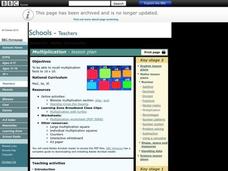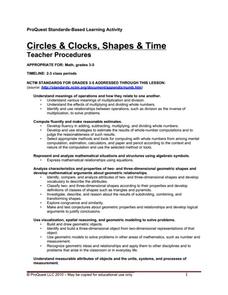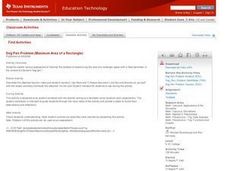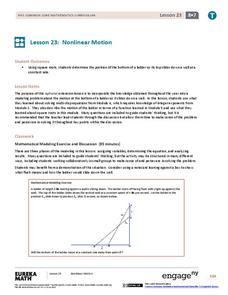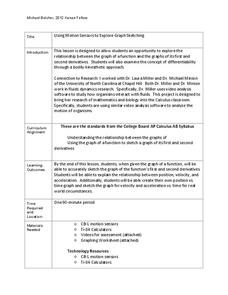Curated OER
Days of the Week
Students participate in a variety of center activities to reinforce the concept of days of the week and their succession. The concept of time can also be taught at the same time to introduce timekeeping.
Curated OER
Multiplication Lesson Plan
Students demonstrate multiplication facts using an interactive whiteboard. In this multiplication lesson, students use an online activity on a whiteboard to master multiplication facts. Students complete an online quiz as a follow-up.
EngageNY
Completing the Square (part 2)
Give classes confidence in completing the square with a resource that develops the process of completing the square of more complex problems, including fractions and values greater than one. It then uses quadratic modeling for...
Curated OER
Nutrition Lesson Plan
Third graders explore a variety of breakfast foods and beverages and write a creative story about their favorite. They then present their stories to the class and are encouraged to try different foods during the story time.
Math Worksheets Land
Multistep Ratio and Percent Word Problems - Independent Practice Worksheet
Math in real life IS a thing and your learners can see how when they practice ratio word problems. Use the handy ratio to convert between measurements and figure out the answer when given a change of information. Resource also comes with...
Curated OER
Lesson Plan fo The Magic Eyes of Little Crab
Interested in a "how and why" story to read with young students? In this storytelling lesson, readers will discuss sea creatures, focusing on practicing new terminology through retelling the story. This resource provides a list of...
Curated OER
Circles and Clocks, Shapes and Time
Students work in groups to research clocks and practice telling time. In this telling time instructional activity, students use the computer program ProQuest to study circles, including radius and diameter, and practice drawing circles...
Curated OER
Dog Pen Problem
Teach your class about various approaches to solving the problem of maximizing the area of a rectangle space with a fixed perimeter in the context of a farmer's dog pen. Then, they complete a worksheet independently to summarize the...
Alabama Learning Exchange
Jump! An Exploration into Parametric Equations
Explore parametric equations in this lesson, and learn how to determine how much time it takes for an object to fall compared with an object being launched. high scoolers will use parametric equations to follow the path of objects in...
Math Solutions
Shape Sorting: Looking for Green!
Young mathematicians rotate, flip, and sort their way to an understanding of the different attributes of geometric figures. Using transparent yellow and blue shapes, children try to match congruent figures together...
Math-U-See
Extra Practice
From exponents to slope-intercept form, an array of extra practice exercises will reinforce necessary skills for your middle and high schoolers. The worksheets include practice with order of operations, graphing equations, scientific...
BioEd Online
Good Stress for Your Body
Stress the importance of the different types of pressure our mind and body experience in a instructional activity about how certain types of stress are actually necessary and good for our bodies. As astronauts and people with injuries...
EngageNY
Nonlinear Motion
Investigate nonlinear motion through an analysis using the Pythagorean Theorem. Pupils combine their algebraic and geometric skills in the 24th lesson of this 25-part module. Using the Pythagorean Theorem, scholars collect data on the...
Kenan Fellows
Using Motion Sensors to Explore Graph Sketching
Get moving to a better understanding of graphs of derivatives. Using motion sensors, scholars vary their velocities to create graphs of the first derivative of a function. The activity challenges groups to first create a script of the...
Education World
Predicting Pumpkins
If you want more pumpkin seeds, you should get a bigger pumpkin—right? Young harvesters use estimation skills to make a hypothesis about how many seeds they will find in a pumpkin before examining the real number inside.
Center for Mathematics and Technology
Whole Numbers: Using an Area Model to Explain Multiplication
There are many ways to work through a multiplication problem. Using an area model, kids complete several worksheets with different types of multiplication problems, including multiplying by ten, and explain how the new strategies differ...



